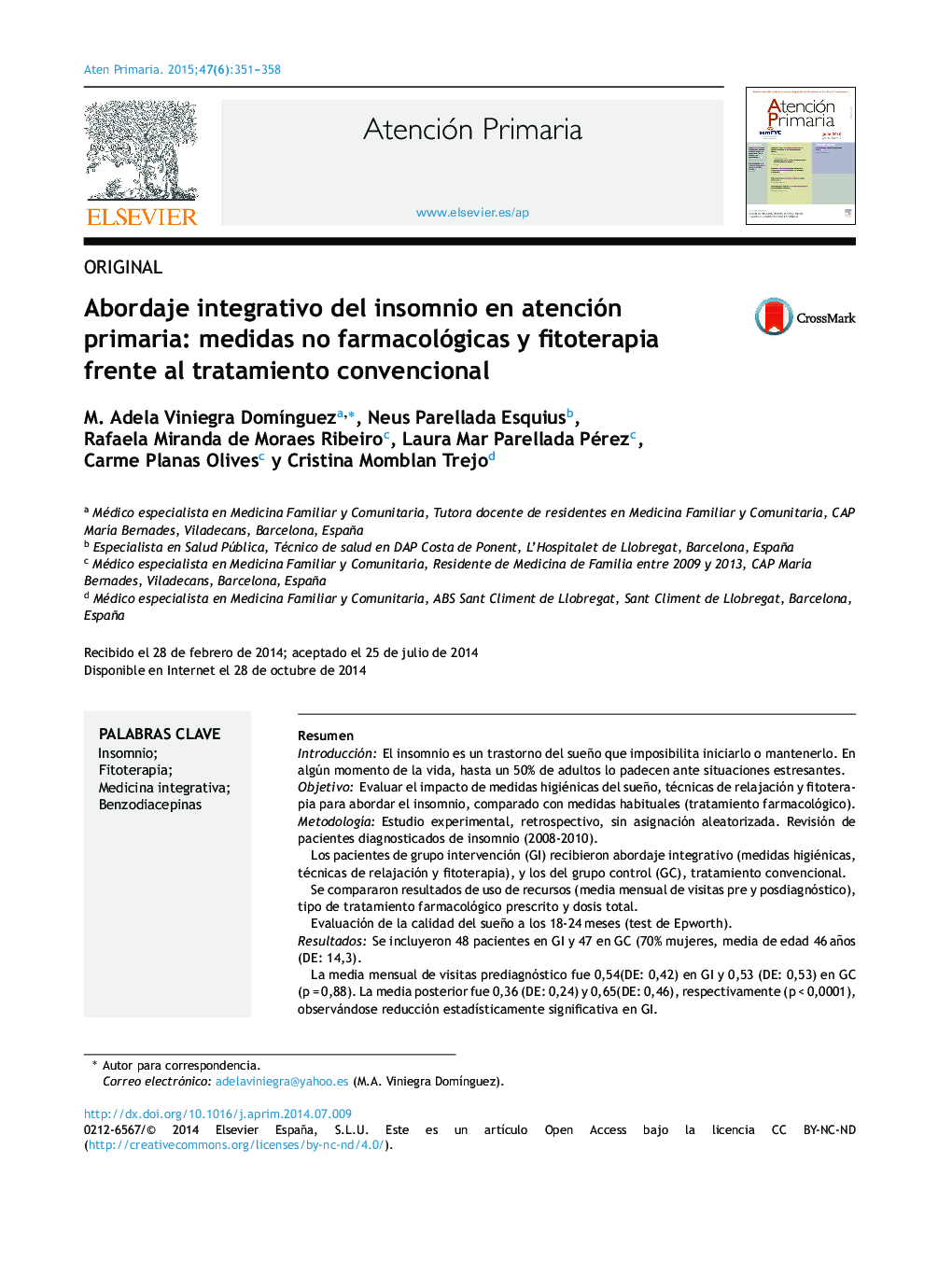| کد مقاله | کد نشریه | سال انتشار | مقاله انگلیسی | نسخه تمام متن |
|---|---|---|---|---|
| 3457071 | 1230885 | 2015 | 8 صفحه PDF | دانلود رایگان |
ResumenIntroducciónEl insomnio es un trastorno del sueño que imposibilita iniciarlo o mantenerlo. En algún momento de la vida, hasta un 50% de adultos lo padecen ante situaciones estresantes.ObjetivoEvaluar el impacto de medidas higiénicas del sueño, técnicas de relajación y fitoterapia para abordar el insomnio, comparado con medidas habituales (tratamiento farmacológico).MetodologíaEstudio experimental, retrospectivo, sin asignación aleatorizada. Revisión de pacientes diagnosticados de insomnio (2008-2010).Los pacientes de grupo intervención (GI) recibieron abordaje integrativo (medidas higiénicas, técnicas de relajación y fitoterapia), y los del grupo control (GC), tratamiento convencional.Se compararon resultados de uso de recursos (media mensual de visitas pre y posdiagnóstico), tipo de tratamiento farmacológico prescrito y dosis total.Evaluación de la calidad del sueño a los 18-24 meses (test de Epworth).ResultadosSe incluyeron 48 pacientes en GI y 47 en GC (70% mujeres, media de edad 46 años (DE: 14,3).La media mensual de visitas prediagnóstico fue 0,54(DE: 0,42) en GI y 0,53 (DE: 0,53) en GC (p = 0,88). La media posterior fue 0,36 (DE: 0,24) y 0,65(DE: 0,46), respectivamente (p < 0,0001), observándose reducción estadísticamente significativa en GI.Recibieron alguna benzodiacepina el 52,5% de los pacientes GI y el 93,6% de los del GC (p < 0,0001). En GC se prescribió más alprazolam y lorazepam, con dosis acumuladas superiores.En la evaluación posterior no presentaban insomnio el 17% de los pacientes del GI y el 5% del GC. Presentaban insomnio severo el 13% de los pacientes del GC y ninguno del GI (p < 0,0001).ConclusionesEl abordaje integrativo del insomnio puede ser resolutivo, disminuyendo las visitas y los efectos secundarios y la dependencia a benzodiacepinas.
IntroductionInsomnia is a sleep disorder in which there is an inability to fall asleep or to stay asleep. At some point in life, 50% of adults suffer from it, usually in stress situations.AimTo evaluate the impact of sleep hygiene measures, relaxations techniques, and herbal medicine to deal with insomnia, compared with standard measures (drug treatment).MethodologyAn experimental, retrospective, non-randomized study was conducted by means of a review of patients diagnosed with insomnia (2008-2010).Patients in the intervention group (IG) received an integrative approach (hygiene measures, relaxation techniques, and herbal medicine) and a control group (CG) with conventional treatment.A comparison was made of the resources used in the two groups (average monthly visits pre- and post-diagnosis), type of prescribed drug therapy and total dose.Sleep quality was evaluated at 18-24 months (Epworth test).ResultsA total of 48 patients were included in the IG and 47 in the CG (70% women, mean age 46 years (SD: 14.3).Average monthly visit pre-diagnosis was 0.54 (SD: 0.42) in the IG and 0.53 (SD: 0.53) in the CG (P = .88). Post-diagnosis it was 0.36 (SD: 0.24) and 0.65 (SD: 0.46), respectively (P < .0001), with a statistically significant reduction being observed in the IG.More than half (52.5%) of the IG patients and 93.6% in the CG had received a benzodiazepine (P < .0001). Alprazolam and lorazepam were the most prescribed in the CG and with higher cumulative dose.In the subsequent evaluation, 17% of patients in the IG and 5% in CG did not have insomnia. Severe insomnia was present in 13% of patients in the IG and none in CG (P < .0001).ConclusionsThe integrative approach to insomnia may be worthwhile as it reduces resource use and side effects, as well as dependence to benzodiazepines.
Journal: Atención Primaria - Volume 47, Issue 6, June–July 2015, Pages 351–358
